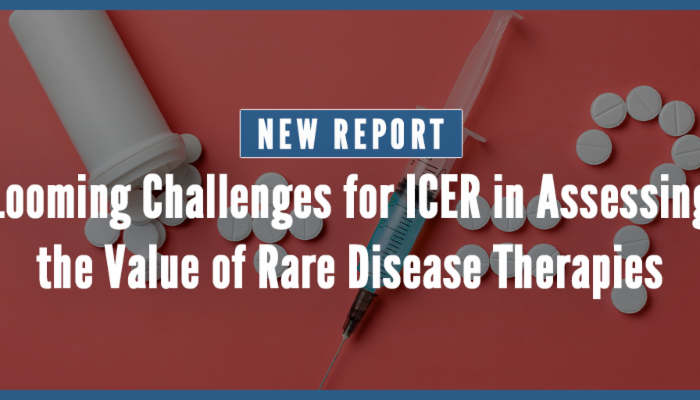Report: Rare Disease Patients Hurt by “One-Size-Fits-All” ICER Framework
This op-ed appeared in ICERWatch on June 26, 2019.
The Institute for Clinical and Economic Review and its controversial “one-size-fits-all” value framework are a direct threat to rare disease patients, an independent report warns.
In its newly-released report, “Looming Challenges for ICER in Assessing the Value of Rare Disease Therapies,” the independent Pioneer Institute identifies a troubling pattern of ICER ignoring the needs of patients living with rare diseases and details how the cost appraiser systematically undervalues innovative treatments for chronic and complex conditions.
“Patients with complex and rare diseases have much to be hopeful for as our knowledge expands and more innovative and specialty therapies come to market,” explains Dr. William Smith, the report’s author and a visiting fellow on life sciences at the Pioneer Institute. “Yet, ICER threatens to limit access to these life-changing treatments.”
2014-2018: No High Value Ratings for Rare Disease Treatments
Among the report’s major findings: Between 2014 and 2018, none of ICER’s reviews of rare disease drugs resulted in a “high value” rating. Insurance companies commonly use ICER’s ratings to justify treatment denials and barriers to accessing life-saving treatments.
“Health care is not an equation,” says Dr. Smith. “Patients battling life-threatening diseases shouldn’t be denied access to treatments because a little-known research group in Boston put an arbitrary dollar amount on their life.”
The in-depth report also raises new questions about ICER’s political agenda and whether its cost-cutting health care framework has any validity in assessing the effectiveness of treatments for rare diseases and conditions.
“ICER’s methodology is, by definition, a “one-size-fits-all” approach that will inevitably fail to keep up with medical science’s understanding of how and why different therapies work differently in different patients,” the report states. “ICER’s approach to rare disease drugs is highly troubling for patients with these diseases, for the physicians who treat them, and for the family members or caregivers who help them.”
Patient Advocates Welcome Assessment of Cost Appraiser
Patient advocates welcomed the Pioneer Institute report and say that it offers independent proof that ICER is unfit to review treatments for rare diseases.
“It’s about time someone assessed ICER’s anti-patient framework,” says Terry Wilcox, executive director at Patients Rising. “For too long, ICER’s assessments have gone unchallenged as they advance the interests of billion-dollar pharmacy benefit managers and health insurance companies.”
Wilcox praised the independent report for considering the harmful effects of ICER’s use of quality-adjusted life year, or QALYs, in its value framework. QALY is a complicated and controversial method of calculating the value of a patient’s life. One QALY is equal to one additional year of life in perfect health or two additional years of life at 50 percent health.
QALY Discriminates Against Patients with Rare Diseases, Chronic Conditions
Quality-adjusted life years, advocates say, also discriminate against patients living with rare and chronic diseases.
“Patients living with rare diseases or chronic conditions can never achieve full value under a system of quality-adjusted life years,” says Wilcox of Patients Rising. “If left unchecked, ICER would rollback vital patient protections included in the Affordable Care Act.”
As part of the Affordable Care Act, Congress banned Medicare from using the QALY methodology out of concerns that it could hurt the ability for the elderly and people with disabilities to access to medical care. ICER has embraced a novel tactic to circumvent these patient protections
“ICER’s ambition is therefore to have state Medicaid programs and commercial plans employ their reviews when making coverage decisions,” the Pioneer Institute report cautions.
Get Updates On Our Life Sciences Work!
Recent Research:










